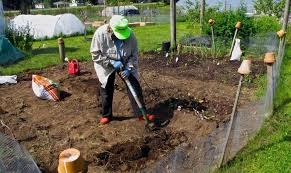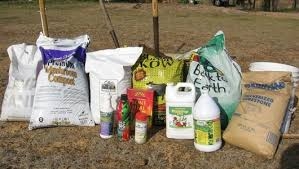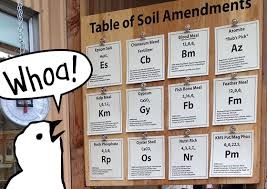
To provide a good home for our plants we need to incorporate some organic matter, usually compost – but not an overload – just the right amounts over time contribute to long term soil fertility, good soil structure and increase the soil's capacity to hold water and air.
All those amendments have their place and their purpose. What are you looking for? How much do you need? How is this product applied? What's in it? Keep in mind that this is an annual event, or even a seasonal event if your gardening season is long and you plant crops successively. Someone once said, “Begin with the end in mind.”

There are organic fertilizers such as compost, aged manure, rock phosphate, soybean meal, and fish meal, and there are inorganic fertilizers that are available either as a single nutrient or multi-nutrient product. These fertilizers can be slow release providing nutrition over time or soluble like an athlete's energy drink, providing quick nutritional value.
Most soil has some residual nutrients, however, only a soil test can assess what is there. Fertilizing without the results of a soil test is like eating everything in the pantry hoping to get the nutrition you need. Additionally, this practice can exacerbate an existing problem or imbalance. A soil test will also tell you the pH which, if too high or too low, can affect the uptake of nutrients present in the soil.

A soil test is a good place to begin to understand what kind of amendments might be needed to build your soil. Generally, DIY kits are not as reliable as sending a soil sample to be analyzed by professionals.
We all want to be thrifty, however, there are a few things you should never add to your garden soil:
- Un-decomposed wood chips or sawdust – these materials are high in carbon but lack enough nitrogen to decompose quickly – so they use up nitrogen that plants want and need.
- Fresh manure can harm plants due to elevated ammonia levels. – Use only aged, composted manure that has reached at least two heating cycles (130-140 degrees F) Also, know that nitrogen levels in composted manure are low and phosphorus and potassium levels are higher – so adjustments will have to be made. Also, salt levels will be higher.
A good way to remember all this is that fertilizers feed plants and compost feeds the soil. Nutrients alone cannot keep plants healthy if they are living in poor soil. Compost improves the mobility of air, water in the soil, and makes nutrients more available to plants.
Finally, there is such a thing as too much compost and too much fertilizer. Armed with the results of your soil test, you will be able to make wise choices about what to buy, how much to use, and when to apply it. When in doubt, a good quality all purpose composted soil amendment and an all purpose fertilizer are probably a reasonable way to get started. Of course, be sure to use them as directed on the bag.
For more in depth information on soil and composting be sure to use the links on the website. This year, biggest tomatoes ever – right??
Attached Images:

